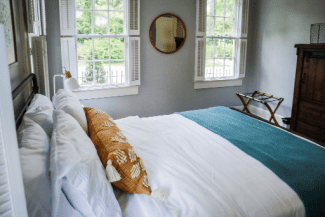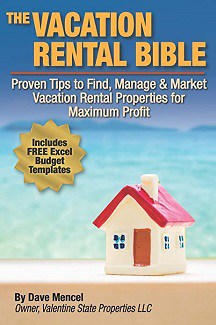5 Steps to Starting a Short-Term Rental Business and 2 Pitfalls to Avoid
By David Mencel, Author of The Vacation Rental Bible and Supercharge your Airbnb
Are you considering converting your long-term rentals (LTR) into short-term rentals (STR)? This could be a good financial move but be aware that despite both LTRs and STRs utilizing the same physical asset (your property), the operating models are quite different. These five steps will help you determine if the STR business is right for you, and help you get started on the process. Avoiding costly mistakes can be just as important, and two of the most common STR pitfalls are also discussed below.
Step 1: Understand the Differences

You’ll have to furnish your property with everything from beds and linens to décor, kitchenware, soap, and shampoo. Length of stay will vary, and your guests (a deliberate word choice, as most STR renters lack tenant rights) may stay as little as one night.
Your STR operation is closer to that of a hotel, though without a reception desk or daily linen service. Unlike a traditional B&B, you also won’t be required to live on site or cook breakfast for your guests, another frequent misconception that stems from traditional B&B zoning laws in many municipalities.
Step 2: Evaluate the Opportunity
Each state and many local municipalities have different laws regarding the regulation of STRs, so evaluate each property to ensure you can operate legally and indefinitely. Build a proper budget with the help of your broker, property manager, or third-party data provider to determine the occupancy levels and nightly rental rates you can sustain and to quantify your planned expenses. A key STR benefit is that you can reserve nights for yourself; the IRS allows 14 days of personal STR occupancy without tax penalty, so take advantage of this and factor it into your financial models.
Step 3: Remodel & Furnish
LTR owners are already familiar with the benefit of remodeling their properties to increase the rental rate; STR remodeling is similar, though you’ll add more features such as nicer lighting, higher-end treatments, and more smart technology such as thermostats and door locks for controlling your property remotely.
Furnishing is new to most LTR owners; aim for durability with a “nice-enough” look, but splurge a bit on cookware, towels, mattresses, and other key guest touch points. A good rule of thumb is to furnish with everything you’d need if you were to fly to the property with one suitcase for three months (even if you don’t expect guests for this long of a time).
Step 4: Manage your Guests
After developing your listings on Airbnb and Vrbo, it’s time to prepare for your first guests!
You’ll have a higher level of interaction with STR guests, including a few rounds of messaging. Most STR guests are on vacation and may ask for your help in recommending restaurants or other activities, so know your area well and be as responsive as possible.
Guest stays may be as short as one night, so be prepared for a never-ending flood of messaging with a perpetual stream of new guests. This surprises most LTR-converts; the time commitment in managing guests far exceeds that of managing LTR tenants (although you can always hire a professional manager to mitigate this workload).
Step 5: Earn 5-Star Reviews
Unlike most LTR owners, STR hosts have a public history of performance. All modern STR platforms have a feature for guests to review both your property and you as a host. Responsiveness is key; if you fail to respond to your guests’ needs, it will be reflected in your reviews. Not only will future guests not want to book your STR property, but Airbnb and Vrbo will push you down the search list if your reviews are lower than those of your competition. Your STR business lives and dies by reviews, so do all you can to keep your guests happy.
Finally, avoid these two common pitfalls when entering the STR business:
Pitfall 1: Skipping Due Diligence
Not every community, city, or state is ideal for STR ownership. Research local laws by working with a broker or agent who specializes in STR properties or reach out directly to that area’s governing body. Local municipalities may also have requirements, such as costly STR permits, annual inspections, special zoning designations, or other various restrictions such as the need to hire a local manager. Getting this step wrong is the most common path to STR financial disaster, so always do your research.
Pitfall 2: Failing to Budget
Budgeting for an STR is more complex than LTR budgeting. Many new owners are lured in by the appeal of higher revenue yet fail to plan for the increased expenses of an STR property such as standard cleanings, soap/shampoo, kitchen staples, frequent replacement of worn or soiled linens, furniture, and more. If you plan to have a professional manager handle your properties, be prepared to pay 20% or higher commissions off the top, which is roughly twice the rate of professional LTR management. Creating a full financial picture lets you make educated decisions as to whether STR management is the right move for you and your personal goals.
Parting Thoughts
When consulting for potential new STR owners, I like to instill both confidence and caution. Like LTRs, STRs fall within the real estate investing arena, and with proper due diligence your risk is low compared to business ventures outside of real estate. The higher profit is more of a function of work-reward than risk-reward.
If you’re not working with a property manager, the hours you’ll put in are exponentially larger than for LTRs. In The Vacation Rental Bible, I refer to buying an STR as “buying yourself a job”. This job can come with a sizeable paycheck, but in the end, it’s still a job (and one you can’t walk away from easily). Unlike your day job, you’re working for yourself, building equity, and establishing a path to financial freedom.
About the Author

















 Accessibility
Accessibility